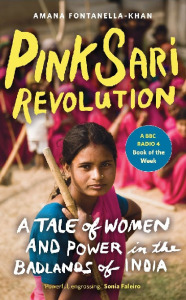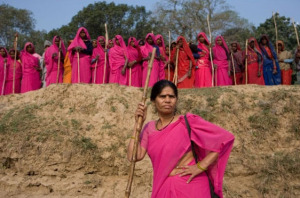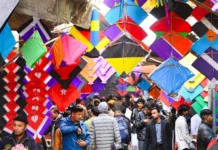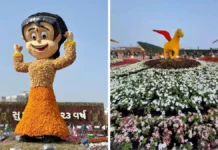 Pink Sari Revolution, traces the life of Sampat Pal, a poor and illiterate woman living in Uttar Pradesh – the “badlands” of India. Married off around the age of twelve, pregnant with her first child at fifteen, and prohibited from attending school, Sampat experiences firsthand women’s struggle in patriarchal India.
Pink Sari Revolution, traces the life of Sampat Pal, a poor and illiterate woman living in Uttar Pradesh – the “badlands” of India. Married off around the age of twelve, pregnant with her first child at fifteen, and prohibited from attending school, Sampat experiences firsthand women’s struggle in patriarchal India.
Against all odds, Sampat rises to become the courageous commander and chief of India’s infamous Gulabi (Pink) Gang. Dressed in pink saris, Sampat and her team, now numbering in tens of thousands, fight for women’s liberation in India. The Pink Gang bravely intervene wherever women are victims of injustice, confronting even policemen and gangsters. Rich with interviews from Fontanella-Khan’s two year stay in India, Pink Sari Revolution is a triumphant portrait of a fiery sisterhood in India.
‘Pink Sari Revolution’ is an inspiring story of poor but courageous Indian women who have decided to rise against exploitation, rampant corruption, injustice and high-handedness of the authorities. The most remarkable woman in the story is Sampat Pal, the founder leader of the Pink Gang who rose out of poverty to become a mighty force to be reckoned with.
The main plot in the book is about a Dalit (lower-caste) girl Sheelu Nishad who was arrested for allegedly stealing from the house of the most powerful local politician Purushottam Naresh Dwivedi,
a Brahmin in the most backward region of Uttar Pradesh, the most populous state of India.
In the normal play of things in India, Sheelu was destined to a long
prison sentence because of the politician-police nexus. But Sampat Pal came to know of the false charges against Sheelu and the fact that Dwivedi had raped Sheelu and decided to shake things up with the help of her Pink Sari Gang.
 The book skillfully portrays the contemporary Indian society. It peels back the layers of poor women’s lives, revealing their personal struggles and the insidious manner in which politics and corruption are woven into the daily life of Indians in a society which has no regard for personal rights and a disastrously dysfunctional legal system.
The book skillfully portrays the contemporary Indian society. It peels back the layers of poor women’s lives, revealing their personal struggles and the insidious manner in which politics and corruption are woven into the daily life of Indians in a society which has no regard for personal rights and a disastrously dysfunctional legal system.
It also brings you up and close to the rural poverty and power in India, where justice is available to those who can afford to bribe the police, if they (the police) haven’t already been bought. In India truth is definitely stranger than fiction and this intimate treatment brings out the vibrancy and vision of women working together to achieve what none could do alone.
Amana Fontanella-Khan writes for Slate, Daily Beast, the New York Times, and the Christian Science Monitor, and was formerly a contributing editor at Vogue India. Previously based in Mumbai, she now lives in Brussels.
Gopi Rai






